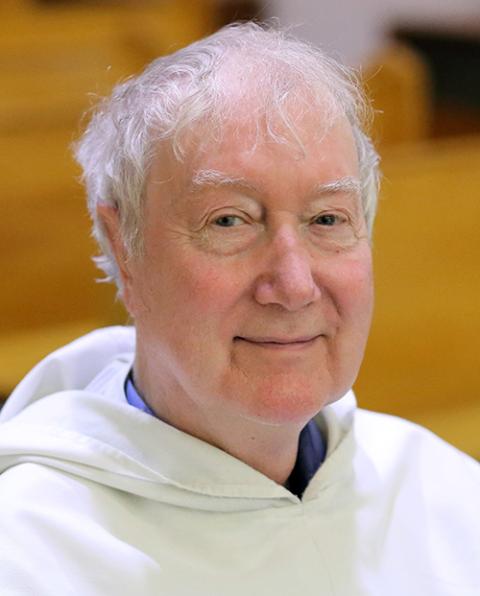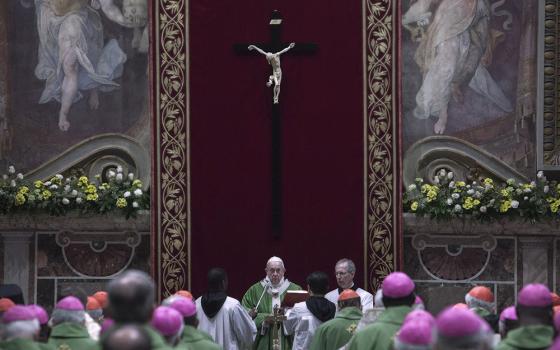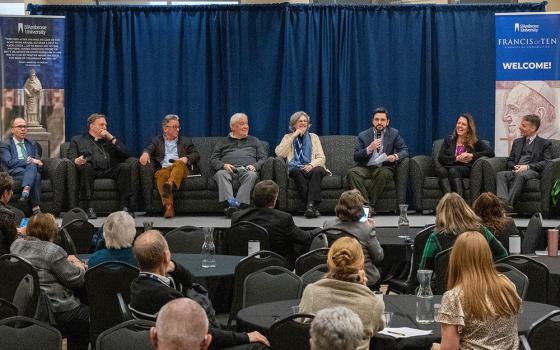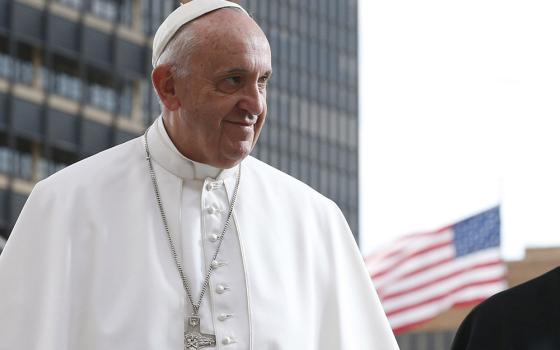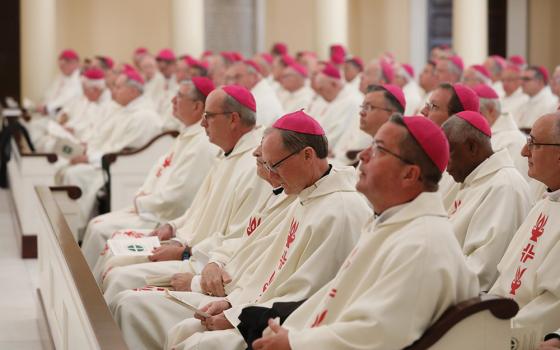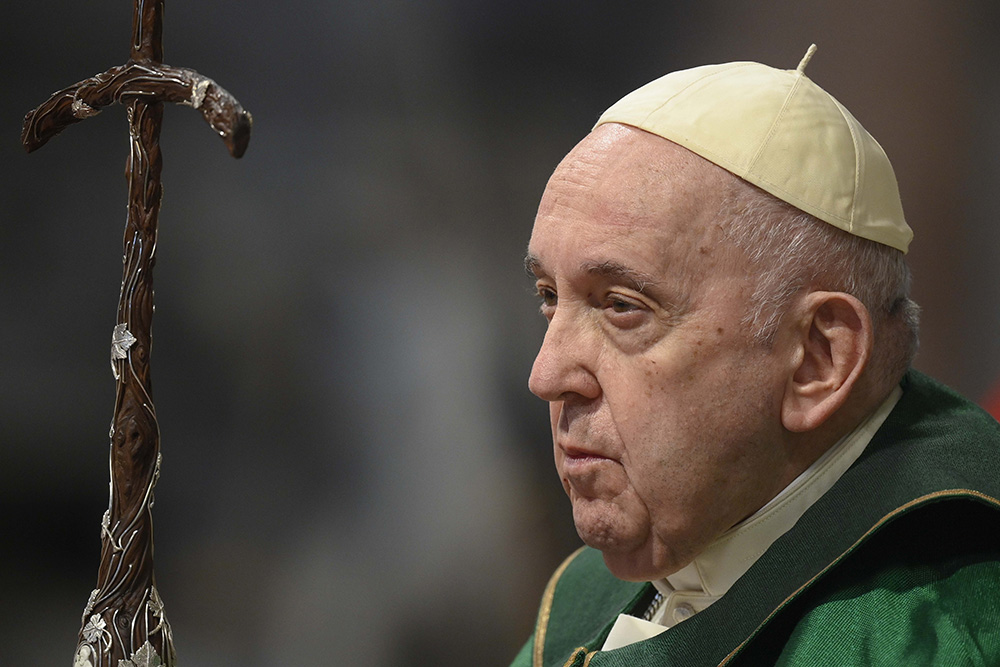
Pope Francis holds his pastoral staff as he celebrates Mass marking Sunday of the Word of God in St. Peter's Basilica at the Vatican Jan. 22. (CNS/Vatican Media)
Is the ground underneath the Vatican shifting? The death of Pope Emeritus Benedict XVI, the nastiness coming from highly placed critics of Pope Francis like Benedict's secretary Archbishop Georg Gänswein and the late Cardinal George Pell, the announcement that the Synod of Bishops in October would start with an ecumenical prayer service, followed by a three-day retreat led by Dominican Fr. Timothy Radcliffe, the coming 10th anniversary of Francis' election, all invite speculation that this papacy is moving into a new phase.
In an interview with the Associated Press, the first since Benedict died, Francis revealed that he would travel to the monastery where his predecessor lived and ask his advice. "For me, he was a security. In the face of a doubt, I would ask for the car and go to the monastery and ask," Francis said. "I lost a good companion."
The pope went on to address the critics. "You prefer that they don't criticize, for the sake of tranquility," Francis said. "But I prefer that they do it because that means there's freedom to speak."
He continued, "If it's not like this, there would be a dictatorship of distance, as I call it, where the emperor is there and no one can tell him anything. No, let them speak because ... criticism helps you to grow and improve things."
Of Pell, the pope said, "Even though they say he criticized me, fine, he has the right. Criticism is a human right," adding, "He was a great guy. Great."
Advertisement
The pope is certainly magnanimous in his assessment of Pell, whose cowardly, anonymous attack on Francis lowered the late cardinal in most people's estimation. Two things are clear. First, Francis is not afraid of being haunted by either the ghost of his predecessor or the ghost of the Aussie cardinal. Second, the nasty criticisms from Gänswein and Pell have left those conservatives in the Curia with far less influence than previously.
As we await appointments to critical positions like a new prefect of the Congregation for the Doctrine of the Faith and the Dicastery for Bishops, conservatives who might have been able to influence the pope in a more centrist direction might find he is less willing to listen to their concerns. After all, he has been patient for 10 long years. What has it gotten him? Certainly not loyalty.
As I noted the day Traditiones Custodes was issued, "Pope Francis is a patient pastor. Until he isn't."
The announcement pertaining to the retreat in advance of the synod in October opens a window into Francis' growing impatience. Radcliffe led the Dominican order from 1992 until 2001 and he was long viewed, like the late Cardinal Carlo Maria Martini of Milan, as a lonely liberal voice during the long pontificate of Pope John Paul II. The conservative National Catholic Register, owned by EWTN, labeled his views "heterodox" this week. But they tend to think Francis is heterodox too!
The appointment of Radcliffe makes sense for a variety of reasons. He has spoken beautifully about synodality and the importance of listening. An Englishman, he would be known to someone like Cardinal Mario Grech, who heads the synod office in Rome. A retreat is not primarily about theology but about spirituality, and Radcliffe's essay about fighting cancer reveals a cleric of keen spiritual insight.
The pope, who knows his opponents are located overwhelmingly in the Anglosphere, could have chosen not to ruffle their feathers by selecting an Italian or a Hispanic of equal spiritual depth, someone unknown to the editors at EWTN. But he chose Radcliffe or approved Grech's choice of Radcliffe. Either way, if the pope entertained the possibility that the selection might ruffle feathers, he was not dissuaded.
Conservative criticisms of the pope increasingly ring hollow. When Archbishop Charles Chaput complained that the synodal process was "imprudent and prone to manipulation," you do not have to be an expert interpreter to translate that observation as "No one listened to me when I was at the synod."
The oft-repeated complaint that the pope sows "confusion" — for example, here and here and here — masks the fact that the critics have no doctrinal change to which they can point as the source of such confusion except one footnote in one post-synodal exhortation, Amoris Laetitia. There, at footnote 351, the pope said that those who are divorced and remarried without an annulment might be readmitted to the sacraments.
Nothing in his first 10 years suggests Francis is going to radically attempt to change any doctrinal teaching of the church, but he might be more aggressive in changing the place of doctrinal teaching in the church.
Shortly after the publication of Amoris Laetitia, Cardinal Donald Wuerl offered a thorough and deft analysis of the text. If anyone was still confused after listening to Wuerl's talk, that confusion is willful.
It seems that after 10 years of patience, the pope is entitled to be less so. Patience did not bring Pell to rally around the pope. It did not bring Gänswein over. The two prelates' complaints about Francis were representative of a well-funded, vocal, organized conservative group within the church.
They may become louder as their influence wanes and their champions die off. They are not likely to be able to stem, still less stop, the reforms the Holy Father is inviting by means of the synodal process going on around the world.
Francis, who just buried his predecessor, knows that the clock is ticking. He may have three, maybe four or five more years as pope. Nothing in his first 10 years suggests he is going to radically attempt to change any doctrinal teaching of the church, but he might be more aggressive in changing the place of doctrinal teaching in the church.
As he said in the AP interview after discussing sinfulness in the context of homosexuality, "It's also a sin to lack charity with one another." That is the Francis Revolution in nine words, a reminder that the beating heart of the Catholic faith is about charity. Why that is confusing to so many says more about them than it does about Pope Francis.
On this central theme of his papacy, don't be surprised if the octogenarian pontiff puts the pedal to the metal in the years ahead.

